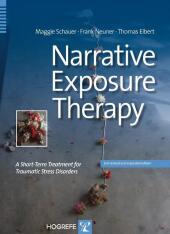 Neuerscheinungen 2011Stand: 2020-01-07 |
Schnellsuche
ISBN/Stichwort/Autor
|
Herderstraße 10
10625 Berlin
Tel.: 030 315 714 16
Fax 030 315 714 14
info@buchspektrum.de |

Thomas Elbert, Frank Neuner, Maggie Schauer
(Beteiligte)
Narrative Exposure Therapy
A Short-Term Treatment for Traumatic Stress Disorders
2nd rev. and expand. ed. 2011. 110 p. w. 22 figs. 28 cm
Verlag/Jahr: HOGREFE VERLAG 2011
ISBN: 0-88937-290-X (088937290X) / 0-88937-388-4 (0889373884)
Neue ISBN: 978-0-88937-290-0 (9780889372900) / 978-0-88937-388-4 (9780889373884)
Preis und Lieferzeit: Bitte klicken
TABLE OF CONTENTS
1 Introduction: Voices of Victims
2 Theoretical Background
2.1 Traumatic Stress
Traumatic Events Stress and the Defense Cascade Violence: The Major Source of Traumatic Stress The Concept of PTSD Psychosocial Problems and Comorbid Disorders in Adults and Children Complex PTSD
2.2 PTSD and Memory
The Nature of Traumatic Memory Sensory-Perceptual Representation Autobiographical Contextual Memory
2.3 Processing of Affective Experiences
Normal Emotional Processing Implications for Treatment
2.4 Narrative Exposure Therapy (NET): The Theoretical Model
Rationale of NET
3 The Therapeutic Approach of Narrative Exposure Therapy (NET)
3.1 The Basic Procedure of NET
3.2 The NET Process Step by Step
Organization of Sessions Second Session: The Lifeline Third Session: Starting the Narration The Following Sessions The Last Session Posttreatment Diagnostic Sessions
3.3 Challenging Moments in the Therapeutic Process: NET In-Depth
The Patient Attempting to Avoid The Patient Spaces Out: Dissociation The Patient Is Withholding Information There Seems to Be No Habituation Therapist Avoidance Memory and Reality
4 Appendix
Appendix A: Informed Consent Form
Appendix B: Event Checklist of War, Detention, and Torture Events
Appendix C: Event Checklist of Family Violence
Appendix D: Examples of Narrations of Life Experiences Resulting From NET
Appendix E: vivo and Contact Addresses of the Authors
References
New edition of the Narrative Exposure Therapy manual, an effective, short-term, culturally universal intervention for trauma victims - including the latest insights and new treatments for dissociation and social pain. Narrative Exposure Therapy (NET) is a successful and culturally universal intervention for the treatment of survivors of multiple and severe traumatic events, such as organized violence, torture, war, rape, and childhood abuse. Field tests in contexts of ongoing adversity and disaster areas, as well as controlled trials in various countries, have shown that three to six sessions can be sufficient to provide considerable relief.
TABLE OF CONTENTS
1 Introduction: Voices of Victims
2 Theoretical Background
2.1 Traumatic Stress
Traumatic Events - Stress and the Defense Cascade - Violence: The Major Source of Traumatic Stress - The Concept of PTSD - Psychosocial Problems and Comorbid Disorders in Adults and Children - Complex PTSD
2.2 PTSD and Memory
The Nature of Traumatic Memory - Sensory-Perceptual Representation - Autobiographical Contextual Memory
2.3 Processing of Affective Experiences
Normal Emotional Processing - Implications for Treatment
2.4 Narrative Exposure Therapy (NET): The Theoretical Model
Rationale of NET
3 The Therapeutic Approach of Narrative Exposure Therapy (NET)
3.1 The Basic Procedure of NET
3.2 The NET Process Step by Step
Organization of Sessions - Second Session: The Lifeline - Third Session: Starting the Narration - The Following Sessions - The Last Session - Posttreatment Diagnostic Sessions
3.3 Challenging Moments in the Therapeutic Process: NET In-Depth
The Patient Attempting to Avoid - The Patient Spaces Out: Dissociation - The Patient Is Withholding Information - There Seems to Be No Habituation - Therapist Avoidance - Memory and Reality
4 Appendix
Appendix A: Informed Consent FormAppendix B: Event Checklist of War, Detention, and Torture Events
Appendix C: Event Checklist of Family Violence
Appendix D: Examples of Narrations of Life Experiences Resulting From NET
Appendix E: vivo and Contact Addresses of the Authors
References


